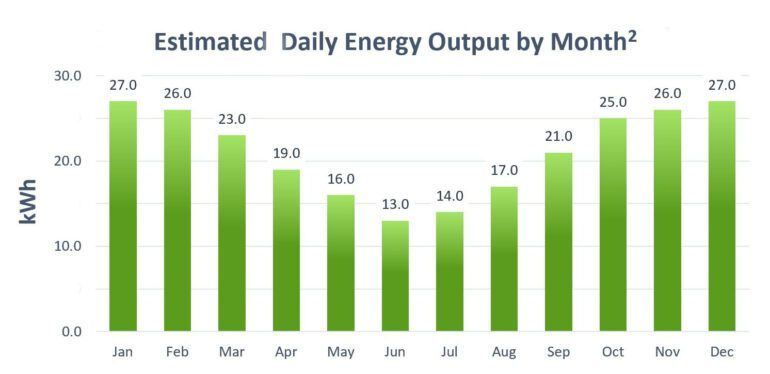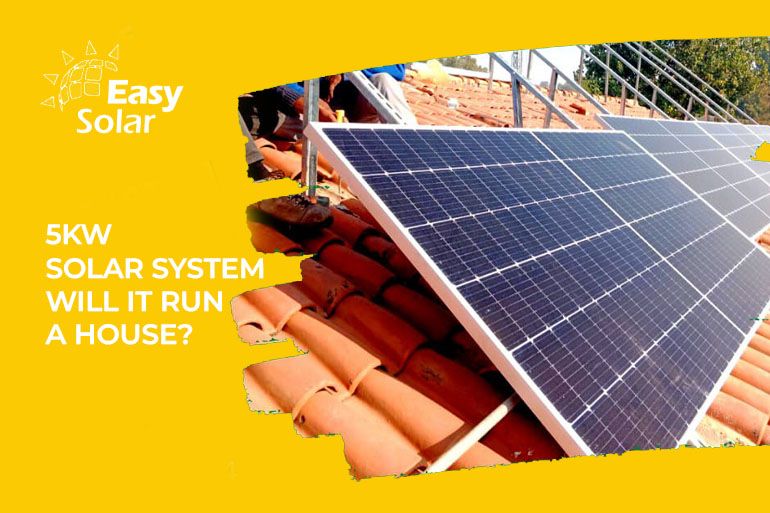A 5kw solar system can be a great way to reduce your reliance on the grid, but it’s important to understand the limitations of a system before making the investment. A 5kw system is a popular choice for homeowners, but it’s not typically large enough to run an entire household.
In most cases, a 5kw system will offset a portion of your energy usage, which can lead to savings on your electric bills. There are a few things to consider when determining if a 5kw system is right for your home. First, consider your energy needs.
A 5kw system will typically produce enough energy to offset a portion of your usage, but it’s important to understand your energy needs before making the investment. If you have a large home or electric bills, a 5kw system may not be enough to meet your needs.
Second, consider the cost of a 5kw system. Solar power systems can be a significant investment, and the cost of a 5kw system will vary depending on the quality of the components and the installation. Be sure to get quotes from several solar installers to compare the cost of a 5kw system. Third, consider the maintenance requirements of a solar power system. Solar power systems require
1. Solar power is a viable option for those looking to reduce their carbon footprint
Solar power is one of the cleanest and most renewable energy sources available, making it a great option for those looking to reduce their carbon footprint. Solar panels convert sunlight into electricity and don’t produce any emissions during operation. In fact, a 5kw solar system can offset about 10 tonnes of carbon dioxide every year1 – that’s the equivalent of driving a car for over 12,000 km! In addition to reducing emissions, solar power can also save you money on your energy bill.
Electricity prices have been on the rise in recent years, and are only expected to continue increasing. Solar power can provide a cost-effective way to insulate yourself from these rising prices. Of course, solar power is not without its challenges.
One of the biggest challenges is the initial cost of solar panels and installation. Solar panels can cost anywhere from $5000 to $25,000, depending on the size and type of system you choose.2 There are also some maintenance costs associated with solar power, though these are typically minimal. Normally in Australia, it takes around 3- 5 years to pay off your solar panels.
Another challenge facing solar power is the intermittency of sunlight. Solar panels only produce electricity when the sun is shining, which means that you’ll need to supplement your solar power with another energy source – like batteries – if you want to be able to use electricity at night or on cloudy days.
Despite these challenges, solar power is a viable option for those looking to reduce their carbon footprint. If you’re interested in solar power, be sure to do your research to find the best system for your needs and budget. 1 https://energysage.com/solar/101/solar-carbon-footprint 2 https://www.energysage.com/solar/cost-of-solar-panels/
2. Will a 5kw solar system run a house?
Yes, a 5kw solar system can provide enough power for a small home or apartment. It will not be able to run a larger home or all of the appliances in a home. However, it’s important to note that a 5kW solar system may not be sufficient to power a larger home or to run all of the appliances in a home.
Larger homes tend to have higher energy demands due to more rooms and appliances, and as a result, a 5kW solar system may not be able to meet those energy requirements.
Overall, a 5kW solar system can be a great choice for powering a small home or apartment, but it’s important to consider the energy demands of your home and appliances before investing in a solar system. Consulting with a solar expert or conducting a detailed energy audit can help determine the appropriate size of the solar system for your specific needs.
3. The average home uses approximately 8,000 kWh of electricity per year
A 5kw solar system can offset a significant portion of a home’s power usage, but it will not be able to completely offset the power usage of an average home. The average home in the United States uses approximately 8,000 kWh of electricity per year, so a 5kw solar system would offset around 630 kWh of power usage per month.
 This means that a 5kw solar system could offset around 22% of an average home’s power usage. In order to completely offset the power usage of an average home, a larger solar system would be needed.
This means that a 5kw solar system could offset around 22% of an average home’s power usage. In order to completely offset the power usage of an average home, a larger solar system would be needed.
4. A 5 kW solar system will generate approximately 5,700 kWh of electricity per year
According to the U.S. Energy Information Administration, the average U.S. household consumes about 11,000 kWh of electricity per year.
A 5 kW solar system will generate approximately 5,700 kWh of electricity per year, which is just over 50% of the average household’s electricity needs. For a family that consumes the national average of electricity, a 5kW system would save them over $500 per year on their energy bill.
In some states, the savings could be even higher due to state and local solar incentives. Solar panels have an average payback period of 5-10 years, making them a very solid investment. While a 5kW system will not completely offset a household’s electricity needs, it will certainly make a significant dent. Any family that goes solar will be doing their part to reduce their reliance on fossil fuels and help combat climate change.
5. Solar panels have an average lifespan of 25 years
The average lifespan of a solar panel is 25 years. Many factors affect the lifespan of a solar panel, such as the quality of the materials used, the manufacturing process, the amount of sunlight the panel is exposed to, and the environmental conditions the panel is subject to.
The quality of the materials used in a solar panel will affect its lifespan. Solar panels are typically made of silicon, glass, and metal. The quality of these materials will affect how well the solar panel withstands the elements and how long it will produce electricity.
The manufacturing process of a solar panel can also affect its lifespan. Solar panels are made by combining silicon and other materials to create a photovoltaic cell. The cells are then arranged into a panel. The quality of the manufacturing process will affect the quality of the solar panel. The amount of sunlight a solar panel is exposed to will also affect its lifespan.
Solar panels need sunlight to produce electricity. The more sunlight a panel is exposed to, the longer it will produce electricity. The environmental conditions a solar panel is subject to will also affect its lifespan. Solar panels are typically mounted on rooftops or in open spaces. They are exposed to the elements, including wind, rain, snow, and hail.
The solar panel will last longer if it is not exposed to extreme conditions. Solar panels have an average lifespan of 25 years. The quality of the materials used, the manufacturing process, the amount of sunlight the panel is exposed to, and the environmental conditions the panel is subject to will all affect the lifespan of the solar panel.
6. Solar power is a free source of energy once the initial investment has been made
Solar power is a free source of energy once the initial investment has been made. This initial investment usually refers to the installation of solar panels and the necessary equipment to run them.
Solar power is not subject to the fluctuations of the stock market, as other forms of energy are, making it a more stable and consistent investment.
Solar panels have a life expectancy of around 25 years, meaning that once they are installed, they will provide free energy for many years to come. In addition to this, solar panels have little to no maintenance costs, making them, even more, cost-effective in the long run.
7. Solar power can significantly reduce your electricity bills
If you’re considering making the switch to solar power, you’re probably wondering about the impact it will have on your electricity bills. The good news is that solar power can significantly reduce your electricity bills, and in some cases, even eliminate them altogether.
How does solar power reduce electricity bills? The answer is simple: by generating your own electricity, you’re not reliant on the power grid, and you’re not paying for the electricity you use. In most cases, the initial investment in a solar power system is offset by the savings you’ll see on your electricity bills.
And, in some cases, you may even be able to sell excess electricity back to the power company. There are a few things to keep in mind when you’ve switched to solar power. First, you’ll want to make sure your solar power system is sized correctly.
Your solar power system should be sized to meet your average electricity usage. Second, you’ll want to make sure your solar power system is installed correctly. A professional solar installer will be able to help you with this.
Finally, you’ll want to make sure you have a backup plan in place in case of a power outage. In most cases, your solar power system will continue to generate electricity even during a power outage. However, it’s always a good idea to have a backup plan in case of an extended power outage.
If you’re considering making the switch to solar power, there’s a good chance it will reduce your electricity bills. Solar power is a great way to save money, and in some cases, it can even help you eliminate your electricity bills altogether.
The 5kw solar system is a great way to save money on your energy bills. It will run a house, but you may need to supplement it with other energy sources during the winter.







